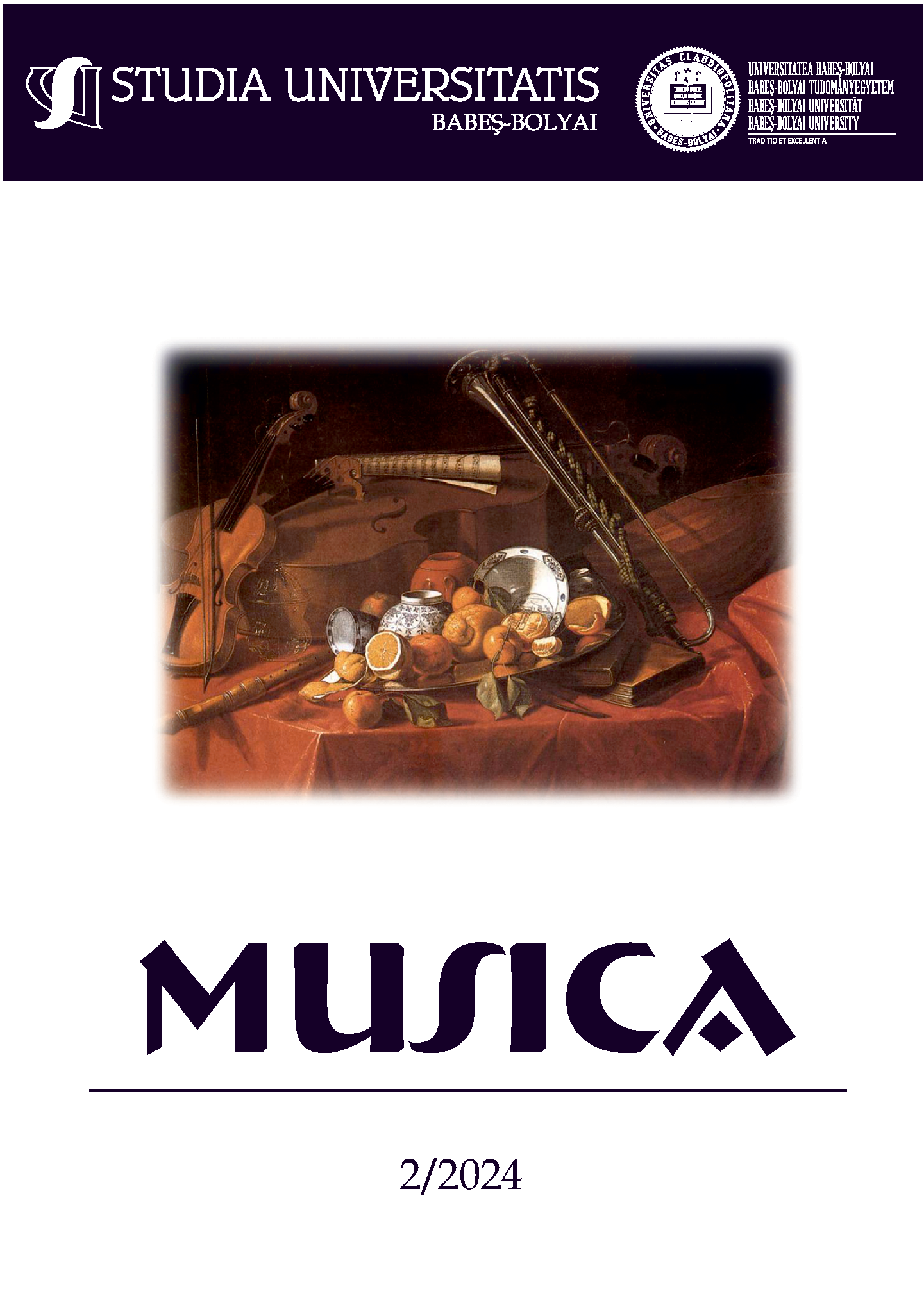Bai Juyi’s Poetry in György Kósa’s Works
DOI:
https://doi.org/10.24193/subbmusica.2024.2.15Keywords:
Chinese songs, György Kósa, Bai Juyi’s poetry, Sándor Weöres, performing arts, creative arts, singing voice, Stella FerchAbstract
The development of the art of song can be linked to German regions. The most intimate of musical genres, it was originally intended to be performed in front of a small audience. The songs were mainly written to poems by contemporary poets, which were read before the music was performed to make it easier to understand. Music on oriental themes appeared in European music from the early 20th century. The first major stage work was a love story set in Japan, which was in fact a 19th-century Italian opera (Giacomo Puccini: Madame Butterfly). Among many other artists, the Hungarian composer György Kósa (1897–1984) was inspired by the culture of the Far East. The poems of Bai Juyi, who lived in the Middle Tang period, reflect, besides social criticism, the all-encompassing happiness of eternal love and the tormenting loneliness arising from love’s painful absence.
References
Schönberg, Arnold. A zeneszerzés alapjai (Fundamentals of Musical Composition), EMB, Budapest, 2014.
Bánky, József. Rendhagyó zongora szakmódszertan (Unconventional piano methodology), University of Pécs, Faculty of Arts, Institute of Music, 2019.
Berlász, Melinda (ed.). Kósa György, Akkord Publishing House, Budapest, 2003.
Bieliczkyné Buzás, Éva. Találkozásom Kósa Györggyel (1980. május 07.) (My Encounter with György Kósa (07 May 1980))
Bieliczkyné Buzás, Éva. Emlékezzünk Kósa György zeneszerzőre (Remembering Composer György Kósa) 15 June 2020, https://xn--hajdtnc-lwa7t.hu/emlekezzunk-kosa-gyorgy-zeneszerzore/ Last accessed on 2022. 07. 01.
Breuer, János. Ahol a zeneelmélet csődöt mond (Where Music Theory Fails), Parlando, No 4., 1960, 10-11.
Csibra, Zsuzsanna. Klasszikus kínai költészet (Classical Chinese Poetry), Pázmány Péter Katolikus Egyetem (Pázmány Péter Catholic University) Bölcsészet- és Társadalomtudományi Kar, Akadémiai Kiadó, 2018, https://mersz.hu/dokumentum/m382kkk__4/ Last accessed on: 2022. 07. 01.
Csörgő, Zoltán. A buddhista szimbólumok világa, A Tan Kapuja Buddhista Egyház (The World of Buddhist Symbols, The Tan Gate Buddhist Church), 2018.
Dobák, Pál. A romantikus zene története (The History of Romanticist Music). Nemzeti Tankönyvkiadó, Budapest, 1999.
Fitzgerald, Patrick. Az ősi Kína, Múlt születése (Ancient China, The Birth of the Past), Helikon, Budapest, 1989.
Földes, Imre. Hangrendszerek és hangsorok a 20. század zenéjében (Tonal Systems and Scales in 20th Century Music). http://www.foldesimre.hu/oldal.asp?id=33 Last accessed on 2022. 07. 01.
Frank, Oszkár. Hangzó zeneelmélet II. (Vocal Music Theory II.), Főnix Zeneműhely, Budapest, 2015.
Hamar, Imre. A kínai buddhizmus története (The History of Chinese Budhism), ELTE East-Asian Studies Department, Balassi Publishing House, 2004.
Horváth, Zsolt. Különféle tonális rendszerek és jelenségek a 19. és 20. században (Different Tonal Systems and Phenomena in the 19th and 20th Centuries), https://music.unideb.hu/hu/kulonfele-tonalis-rendszerek-es-jelensegek-19-es-20-szazadban. Last accessed on: 2022. 07. 01.
Kwei Chen. "Po Chu-i: People's Poet," in China Reconstructs, Vol. 4, July/August, 1953, 31-5. https://www.enotes.com/topics/po-chu/critical-essays/criticism, Last accessed on: 2022. 07. 01.
The poems of Po Csü-i, translated by: Sándor Weöres, Rough Translation and notes by Barnabás Csongor (1952) Szépirodalmi Kiadó, Budapest.
Po Csü-i. https://terebess.hu/keletkultinfo/pocsuji.html Last accessed on: 2022. 07. 01.
Romsics, Ignác. Magyarország története a XX..században (The History of 20th Century Hungary), Ed. Osiris, Budapest, 2001.
Stachó, László. A zenei képesség és az előadóművészi kiválóság (Musical ability and excellence as a performer), in Parlando, https://www.parlando.hu/2014/2014-1/2014-1-02-Stacho2.htm#_edn2 Last accessed on 2022. 07. 01.
Strobel Heinrich. Paul Hindemith, Mainz, B. Schott's Söhne, 1948.
Szekeres, József (ed.). Az ismeretlen Sztanyiszlavszkij (The Unknown Stanislavsky), Színháztudományi Intézet Budapest, 1960.
Tőkei, Ferenc – Miklós, Pál. A kínai irodalom rövid története (Short History of Chinese Literature), Gondolat Kiadó, Budapest, 1960.
Turcsányi, Emil. Mit jelent a bitonalitás? (What Does Bitonality Mean?). Parlando, 1964/2.
Zsoldos, Péter. „Kósa György”, in: Muzsika (Music), 1972, XV., 4.
Downloads
Published
How to Cite
Issue
Section
License
Copyright (c) 2024 Studia Universitatis Babeș-Bolyai Musica

This work is licensed under a Creative Commons Attribution-NonCommercial-NoDerivatives 4.0 International License.



